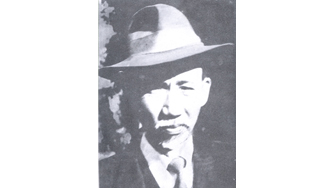
According toDictionary of Literature(New series), written by Professor Hue Chi, Professor Cao Xuan Huy was born in 1900 in Thinh My village, Cao Xa commune, Dien Chau prefecture, now Dien Thinh commune, Dien Chau district, Nghe An province, in a family of great intellectuals of the Nguyen dynasty. The Professor's grandfather was Bachelor Cao Xuan Duc (1843-1923), a famous educator, culturalist, historian, and writer in the late 19th and early 20th centuries. From a district official, with his talent and virtue, he gradually rose to the positions of Governor, Minister of Education, Privy Council Grand Minister, Regent Grand Minister, and General of the National History Institute. Mr. Cao Xuan Duc was the author and presiding officer of many important historical, geographical, legal, educational, and cultural works and composed many excellent literary works for posterity. The Professor's father was Associate Professor Cao Xuan Tieu (1865-1939), who also held the position of Minister and General of the National History Institute of the Nguyen dynasty. The Professor's aunt was female writer Cao Ngoc Anh (1878-1970), a modern Vietnamese writer, supported the Dong Du and Dong Kinh Nghia Thuc movements, fought against the French, opened a school to teach literature and martial arts for women in Hanoi and was closed by the French colonialists, her poems and literature contained the sadness of a people who lost their country.
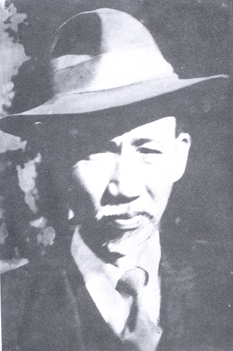
Professor Cao Xuan Huy (1900-1983)
As a child, following family tradition, Professor Cao Xuan Huy honed his ancient Chinese characters and Confucianism in his grandfather's Long Cuong library in his hometown, along with his French studies. At the age of fifteen, he took the provincial exam at Nghe An examination school but failed, so he entered the Franco-Vietnamese High School and passed the Thanh Chung exam in 1922, then took the entrance exam to the prestigious Indochina Pedagogical College, graduating from this school in 1925 and teaching at the National School in Hue.
In 1926, at the age of 26, mature in knowledge, the Professor joined the Tan Viet Revolutionary Party. In 1927, the Professor was arrested by the French colonialists, dismissed from the education sector and exiled to Lao Bao, then transferred to Nghe An prison and released in 1929. The Professor started a family and focused on art and research, but his work was not smooth. However, during those 6 years, the Professor also pondered the quintessence of Chinese and Eastern philosophy and thought. In 1934, the Professor went to Bien Hoa and then Saigon to teach at Paul Doumer School and Chan Thanh School. In 1938, the Professor returned to Hue to teach and devoted himself to studying Lao Tzu and soon became famous as a "Taoist". He collaborated in writing essays for the educational magazine Revue Pesdagogique in Hue.
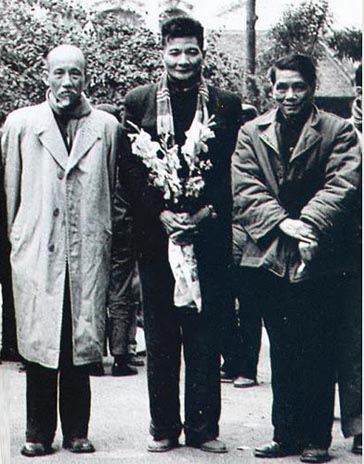
From left to right: Professor Cao Xuan Huy, critic Hoai Thanh, Professor Dang Thai Mai
After the August Revolution succeeded in 1945, the Professor was invited to teach Oriental Philosophy at the Vietnam University established by the newly established regime. The Franco-Vietnamese War escalated, and the Professor returned to Dien Chau from 1946 to 1949 as Principal of Nguyen Xuan On Private High School, training talents for the liberated zone of the resistance war. In 1949, the Professor was a teacher at Huynh Thuc Khang Specialized High School and a Philosophy Professor of the first University of Literature class opened in Inter-Zone IV. From 1951 to 1954, the Professor taught Philosophy at the Vietnam University Preparatory School opened in Thanh Hoa. After the Dien Bien Phu victory, the Professor was assigned to teach Oriental Philosophy, Logic, and Psychology in two classes: University of Literature and University of Literature Pedagogy. In 1956, Hanoi University was established, and the Professor worked at the Faculty of Literature of the school. In 1957, the Professor was transferred to teach psychology at the Faculty of Philology, Hanoi National University of Education. In 1959, the Institute of Literature Research was established, and the Professor was one of the first members. In 1965, Professor Cao Xuan Huy was appointed as the main Professor of the first Sinology University class of the Democratic Republic of Vietnam. In 1970-1974, the Professor was transferred to be a member of the Han Nom Committee, under the Vietnam Social Sciences Committee. The Professor was always invited by the University of General Sciences and the University of Pedagogy to be a visiting Professor, continuously training generations of students. The Professor officially retired in 1974 but still participated in training Han Nom classes for the Faculty of Philology, Hanoi National University. The Professor passed away in 1983 in Ho Chi Minh City.
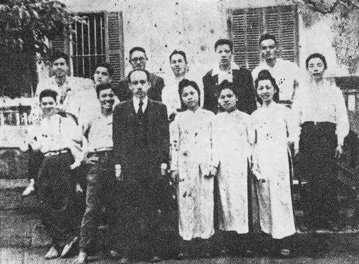
Professor Cao Xuan Huy and students (documentary)
Professor Cao Xuan Huy left behind not many but extremely quintessential writings. Throughout his life, the Professor was an educator who tirelessly trained talents for the revolution, for the country, for the regime. Later, in 1995, generations of the Professor's students collected documents and lectures and printed them into a work.Eastern thought, suggestive reference pointsIn addition, he also has research, editing, and annotation works on Le Quy Don and Nguyen Truong To.
The accumulation of Cao Xuan Huy phenomenon can be seen through the following aspects:
One is the inheritance of innate intelligence from the family lineage, being strictly trained in the style of Eastern classical studies, living in an academic atmosphere, in a family library with the maximum richness of letters and books. The style of researching and generalizing documents from a family of two generations of the General of the National History Institute has created conditions for the knowledge and intelligence of the Professor to develop and take shape early. The learning style and the process of self-cultivation are the foundation for the excellent thinking of the Professor.
But many intellectual families have learning and training. The second thing that made Professor Cao Xuan Huy must be early exposure to Western thought and philosophy. This is what gave the Professor the basis of reference to confidently embark on his path of metaphysical philosophical research.
But both of those things are also available to many people. The third thing is the choice of rich and complex Eastern philosophy, difficult to explain, especially with Buddhism and Taoism, the two most advanced and legitimate philosophical systems that created the Eastern worldview, as the target of their approach to reference with the West. This choice is early and unique, full of difficulties because not everyone has the conditions to pay deep attention.
The fourth thing that made up the Professor's personality was his ardent patriotism, not willing to be a slave to his country. The Professor soon joined the Tan Viet Revolutionary Party to fight against the French, and later stood firmly on the side of the resistance force to build a democratic republic, and fight to protect the fatherland.
The fifth thing that makes up the personality of the Professor is his revolutionary ideology. Born and raised in a family of great feudal intellectuals, but like many intellectuals in the early 20th century, he soon absorbed the light of Freedom - Equality - Fraternity of the French bourgeois revolution and later absorbed the dialectics of Karl Marx. Professor Cao Xuan Huy's ideology is a revolutionary ideology in academia and in the practice of teaching philosophy and culture.
The sixth thing is the morality and personality of the educated person, teaching people tirelessly in the most difficult conditions of war and economic life, the composure of a person who holds in his hands the ultimate knowledge to think and perceive current events.
The convergence of those six things, a convergence that does not always happen, makes Professor Cao Xuan Huy, along with Professor Tran Duc Thao, become the two most outstanding philosophers, with the clearest and purest philosophical thinking of Vietnam in the 20th century, honored by intellectuals and acknowledged by world scholars. At that level, there are only two!
It is necessary to mention the unique and excellent philosophical thought of Professor Cao Xuan Huy, which is a philosophical monograph completed in 1958, which when later printed, his students namedHolism and Particularism – Two forks in Eastern and Western philosophy.
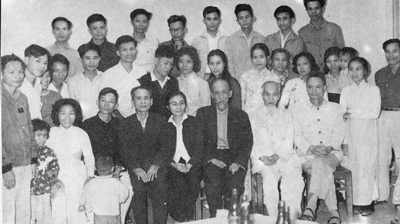
Professor Cao Xuan Huy and staff of the Institute of Literature (documentary photo)
Without being imbued with incomparable Western philosophy and without being well-versed in Eastern philosophy, this early discovery could not have been made. Professor Cao Xuan Huy has touched the most basic, highest level that an abstract thinking, a general philosophical thinking can reach in comparing East and West. For Western philosophy until the mid-20th century, as well as our current general concept of philosophy, the two categories of Existence and Consciousness, the relationship between them, are still the two ultimate categories of philosophical thinking. Idealistic philosophy or materialistic philosophy is tested through that touchstone. A dualistic thinking is established from its origin. However, with Taoist philosophy, Buddhist philosophy and Confucian social management theory (of course, having a natural relationship with the above two philosophies in history), the problem does not seem to stop there. These philosophies want to go to the end of both Existence and Consciousness and the concepts of Non-Existence, Form-Emptiness, Reality-Mystery... were born in the ultimate relationship of unity. Both monistic and dualistic. Consciousness is not only a reflection of Existence but it is also an Existence itself, an objective existence like Existence itself. And both Existence and Consciousness are not only universal interactions, but both operate according to universal laws that both Buddha and Lao Tzu call the TAO. TheThuong Daothat operates eternally as the most universal laws, in eternal interaction, without separation. And so, it reaches the character of TOTALITY in philosophy. Lao Tzu replied to Confucius:
“The way that can be told is not the eternal way. The name that can be named is not the eternal name. The nameless is the beginning of heaven and earth. The nameless is the mother of all things.”What can be called the Way, as you think, is not the constant Way as I am conceiving it! Just as what can be called Name, what you are trying to know, is not the usual name as I conceive it, it is the naming, the expression of the expressed. When there was no human perception at first, everything was nameless. But when there was perception and naming, it categorized Existence to help us Consciousness. on Existence). Taoism starts from such propositions to move towards the complete and absolute harmony of the universe. Perhaps, the path of modern natural science is moving towards explaining the absolute and fundamental harmony of the original universe. The total and the particular interact in reference to arrive at the perception of the entire universe.
The lessons of Professor Cao Xuan Huy still beckon generations of Vietnamese intellectuals to look forward to. Up to now, writing about the Professor is just a matter of "breaking the measuring stick".
|
PROFESSOR CAO XUAN HUY
+ Work unit: Faculty of Letters (1954-1956). Faculty of Literature (Hanoi University) (1956-1957).
Holism and Particularism – Two forks in Eastern and Western philosophy. Eastern thought, suggestive reference points(1995).
+ Ho Chi Minh Prize for Science and Technology in 1996 for the projectEastern thought, reference perspectives. |
Author:Nguyen Hung Vy
Newer news
Older news